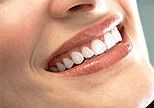Dental Reconstruction: Contour Shaping

Contour shaping is a form of dental reconstruction involving the removal of small amounts of tooth enamel to change the length, shape or surface contour of a person's tooth. Contour shaping is an effective way to correct minor imperfections and can also improve one's overall dental health by removing minor crevices or overlaps in areas where dental plaque and tartar accumulate.
Contour shaping should not be considered a substitute for dental bonding or veneers. If your teeth have substantial problems such as deep chips or fractures, contour shaping is not a recommended dental procedure. An alternative procedure may involve the dentist combining a contouring procedure with a bonding procedure. In this way, a composite resin is used to repair or restore the fractures, chips or cavities, then the tooth is shaped.
Contour shaping should only be performed on structurally sound teeth. Before doing the procedure, the dentist determines the size and location of the tooth's pulp. The pulp area contains the nerves and blood vessels of the tooth. If it is determined that the tooth has enough enamel material and the pulp does not lie close to the surface of the tooth, the procedure can be done. During the procedure, the dentist uses either a sanding disk or fine diamond burs to remove small amounts of tooth enamel. If the imperfections lie between teeth, strips of sandpaper is used to shape and smooth the sides. Once the teeth are reshaped, they are then polished.
Contour shaping does not affect the living pulp in the tooth. Therefore, this type of dental reconstruction is often performed without the use of anesthesia. The process may take on average one or two dental visits and because it does not involve the use of artificial dental materials, there are no special aftercare needs. However, if the dentist uses a composite resin to bond one or more teeth, you will want to stay away from foods and drinks that cause staining.
|
Having a reconstructive procedure involving contour shaping has not been found to cause any major risks. However, depending upon the thickness of the tooth enamel, a tooth that has been recontoured may feel a little sensitivity. If this sensitivity persists, contact your dental provider for further assistance. |
